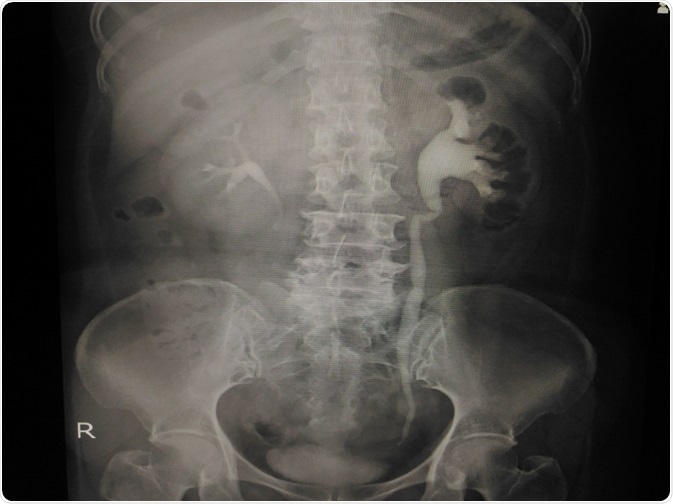Ureteric calculi (i.e. stones in the ureters) is a medical condition that usually causes an abrupt onset of pain in the flank and loin, which may be accompanied by nausea, vomiting and blood in the urine, among other signs and symptoms. The presence of stones in these tubes which allow urine to pass from the kidneys to the bladder most commonly occurs in the 20-49-year-old age bracket. These stones may be predominantly composed of calcium, struvite (magnesium ammonium phosphate), uric acid or cysteine, in increasing order of prevalence.

Blur Special Examination I.V.P: Show a 4mm.calcified stone at distal Lt. ureter. Credit: Tonpor Kasa/ Shutterstock.com
The causes include inadequate fluid intake, dietary factors, heredity, anatomical abnormalities of the urinary tract and chronic urinary tract infections (UTIs). Furthermore, hormonal imbalances, metabolic disturbances and dry/hot climates are all factors that may also be implicated in the etiopathogenesis of stone formation.
Diagnosis involves the use of imaging modalities, such as kidney-ureter-bladder (KUB) radiographs, computed tomography (CT) scans and ultrasound scans. Depending on the indication, pyelography and nuclear scans of the kidney using radioisotopes may also be required.
Treatment is dependent on the composition as well as the size, shape and associated symptoms of the ureteric stone. Small stones are observed with the anticipation of passing spontaneously. Uric acid, and to a lesser degree cysteine stones, may easily be managed with alkalization of the urine.
Calcium stones, as well as those which are larger and more difficult to pass, are managed surgically with techniques such as ureteral stenting, ureteroscopy or extracorpeal shockwave lithotripsy. These methods allow for the physical manipulation of ureteric calculi, breaking them into smaller pieces or removing them through surgical incisions.
Outlook
After treatment, patients require to be followed up by a urologist. This follow-up is especially important for those who are having a stone for the first time. The workup at this time usually consists of analyzing the stone and running metabolic, hormonal and other tests. These are essential for determining the risk of recurrent stone formation and taking the necessary precautionary measures, where applicable, to avoid it. Stone etiology can be identified with the help of a chemical analysis as well as serum tests and 24-hour metabolic tests of the urine.
After surgical management of ureteric stones, as with all other surgical procedures, there is a risk of bleeding and infection. Specific for the urinary system, there is also a risk of ureteric obstruction and perforation. Post-surgical pain may also be present, but can be managed with analgesics.
Fever (due to possible systemic infection), failure to pass urine or heavy bleeding are complications that require urgent medical attention. Recurrence after a first episode of a ureteric calculus is very likely, especially for non-calcium stones, if preventative measures are not undertaken.
Prevention
Individuals at increased risk for stone recurrence may need to make several adjustments to their lifestyle and diets. In addition to these, they may need to be prescribed prophylaxis that will inhibit the re-formation of urinary stones, depending on co-existing morbidities. Many studies have shown that fluid intake is inversely proportional to stone formation.
For this purpose, patients are encouraged to increase their intake to total, at the very least, 3 liters of fluid per day. Naturally, water is preferably the fluid of choice; moreover, patients should monitor the pH of other drinks and aim for those that are pH neutral.
A balanced diet that is rich in fiber, fruits and vegetables is essential. As a golden rule, nothing should be in excess, especially salt and animal protein. Calcium intake should be maintained at normal levels, because there is no conclusive evidence to support that reduction in calcium intake is associated with a decrease in the risk of calcium stone formation. Lifestyle modifications to reduce co-morbidities, such as arterial hypertension and obesity, should be taken as there is experimental correlation between these and the propensity to form stones.
References
- https://uroweb.org/
- http://pmj.bmj.com/content/postgradmedj/27/305/128.full.pdf
- https://www.ncbi.nlm.nih.gov/pmc/articles/PMC2600100/
- https://radiopaedia.org/articles/ureter
- https://www.ncbi.nlm.nih.gov/pmc/articles/PMC2518455/
Further Reading
Last Updated: Dec 28, 2022